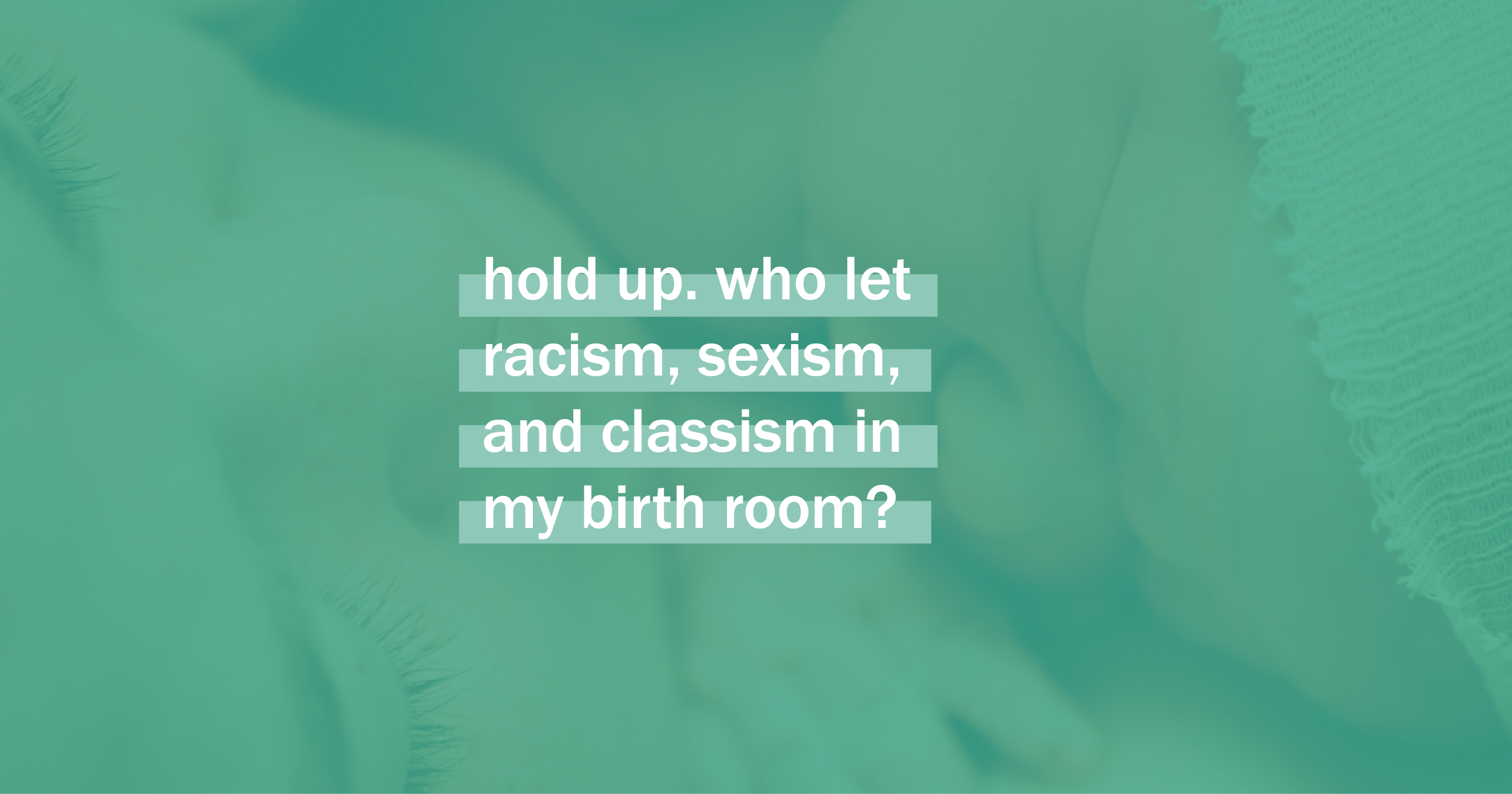Real Support for the Support Person: I Did the Math on the NY Doula Pilot Program
Photo by Jessica Felicio on Unsplash
It’s been stirring in my mind for quite a while now — Every time I see another fundraiser for midwifery school, or hear of another person taking a break to get a job to support themselves or their families for a while, or hear a birth worker tell me about the shocking discrimination they experienced at the hand of a care provider, nurse, midwife or another birth worker, or even think about some of the things I’ve encountered myself as a doula in my community…
“What do you know about the experience of the Black birth worker?”
When this question was asked in a small room of mostly white birth workers in my city, the room fell quiet. And then — I can’t remember if someone literally asked, “Is it different for Black birth workers?” Or not — or maybe in other words — but I know the bit of conversation that followed made it clear that this question just hadn’t really occurred to many people before.
But yes, it’s different.
And now, I have this awful feeling that I’m a broken record, but if I am… it’s not because I’m broken it’s because the broken things I’m talking about still haven’t healed. And the NY Doula Medicaid ordeal is a prime example of that truth.
Because once I looked into it, it became incredibly clear to me that this initiative is more about lip service to a buzzing topic than actually delivering consistent and quality support to the folks it’s claiming to — and will, beyond that, do a disservice to the folks who support them.
According to the New York State Doula Pilot Program webpage, doulas will be reimbursed $30 per prenatal visit, $300 per birth attended, and $30 per postpartum visit. Why?
“Fees are approximately 43% of NY OB/GYN professional fees and 50% of midwife fees.”*
Alright. So let’s go ahead and think about this.
The average rent for a one-bedroom in New York City is $3,100. The average spent on utilities in the U.S. generally (couldn’t find it for NY specifically) is $211. Average on food is $317. Transportation, $211. Entertainment, $106. Clothing, $106. Insurance and other misc costs, $106 (which is ridiculously low). Let’s pretend this doula has no debt. Let’s say they’re just trying to set aside $100 a month for emergency savings.
Total: $4257 a month for one doula, living alone with no child or partner, (and certainly not also pursuing midwifery school or certification).
The NY Doula Pilot Program page estimates 7 visits and one labor and delivery visit per doula client, a total of $510 per doula client (also note that 2-3 prenatal visits, labor support, and one postpartum visit are standard for most doulas).
So, doing the math, it would take 9 clients a month (9 births, and 63 prenatal visits) for that doula to stay financially afloat (if the reimbursement comes through quickly enough to pay those bills). Let’s just act like this is reasonable for now and move forward…
“But Cheyenne, the NY Doula Pilot Program isn’t only for Black birth workers, so why are you conflating the two?”
It will not only impact Black birth workers but it will largely impact Black birth workers since many do have and will continue to have clients on Medicaid.
“But Cheyenne, the Medicaid Reimbursement doesn’t need to be their only source of income, they can work a part-time job or take clients who can pay better, too.”
Alright let’s say they have a part-time job — 20 hours a week, $12/hr (min wage in NY is $10.40/hr).
Now they’re making $960, so they only need to fill a $3,297 gap. They’d need to attend to 7 clients (7 births and 49 visits) in the remaining 20 hours a week to make that work.**
Not only that, they’d need to specifically have a part-time job with a boss who’s willing to be flexible with them when they get called to a birth during their shift hours — who won’t just fire them — and because inevitably they’re going to have some overlap between working hours and labors — it’s incredibly unlikely they’d even make the full $960 a month.
Now let’s say they take one client a month who can pay $1200 (about the average cost of a doula). They’d need to make $3,057 more.
That’s 6 more clients. Which is a total of 7 clients (7 births and 49 visits). And let’s take a moment to consider that 7 due dates in one month… a few of those babies are coming at the same time. So no way is that doula going to be able to be present for all of those visits and all of those births. So really… they’d need more…
AND, let’s acknowledge the cost of time we’re talking about here. Because you know this doula is going to have to take time to process all the paperwork for all of these clients, and pay for postage or whatever to submit them, and wait for reimbursement to be processed and allotted to them.
“But Cheyenne, maybe they can fundraise the difference.”
Black and POC birth workers are already fundraising to the ends of the earth to support our work. We ask for funds straight up, we offer little rewards, we turn to fun slogan t-shirts — we’ve been doing this.
In fact, we’re already working multiple jobs, too — trying to juggle clients who are able to pay more and those who are not able to pay as much, too — living with roommates to reduce costs, applying for scholarships, dipping into savings, living without certain things, leaning on friends and family, etc.
And all the while that we do these things, we experience discrimination just like our clients do — day to day in normal life, and in the birth world, too — whether because unconscious or conscious bias based on the color of our skin or because of distaste for / misunderstandings of our roles as support people or all of the above.
And by our peers we are asked to explain (“Can you teach me about…”), solve (“Tell me what I need to do…”) and not to talk about (“Why does race have to be brought into everything?”) the inequities that we face.
As we look into the eyes of the parents that we work with, telling them, “I am here to support you,” many of us are being forced into corners that leave us feeling unsupported ourselves. And then we look around as see that we’re not alone in this. And we talk about it. And we wonder (among other things), “When will something be done to support us?”
And then a headline about a Doula Program pops up. And we open the page. And what do we see…
It is more than a little frustrating. It is literally adding insult to injury to create a system to support a group of people that cannot support the support persons themselves.
“But Cheyenne, if you’re okay with taking on free births in general, why aren’t you grateful for some support from this program for NY doulas?”
Payment from a program like this and payment directly from a client — that’s a horse of a different color.
The families we’re working with on Medicaid aren’t handling budgets of millions of dollars, moving money around on spreadsheets with teams of accountants, looking at income flow from multiple avenues and then telling us, “This is what I have left to set aside for your services.”
Is a response like mine actually ungrateful, or holding a capable authority to a reasonable standard?
But Cheyenne, at least they’re trying something, right? Can you really expect it to be perfect out the gate?”
Birth work is a job. Birth workers are doing a job. A job with expenses we must pay to perform it properly. A job that takes a physical toll on our bodies, and an emotional toll on our beings. A job that sometimes requires that we remain as a continuous support person for 10, 12, 16, 24+ hours.
Yes, it’s a beautiful job that we feel called to and incredibly honored to do… and it’s so impactful that many of us are WILLING to make sacrifices to do it — but that does not mean we shouldn’t expect to be able to sustain our own lives through it.
And I’m not saying that I don’t think folks should participate in this pilot program, or that it shouldn’t exist at all. I hope that many people do participate and find ways to make it work for them, and advocate for improvements that would make it better.
But I have a very real concern that there’s no intent to improve it — that in fact, people somewhere are patting themselves on the back for what they’ve created — a system that perpetuates the “Strong Black Woman” trope by making “Strong Black Birth Workers” who must make due with the little allotted to us on top of the regular set of stressors we continue to have.
Nothing would make me happier than to be proven wrong on that.
Because to be honest, I’m not interested in the “Strong Black Birth Worker” blue ribbon for myself or anyone else. I want safety, support, joy and empowerment. As we stand in the gap for those who are bringing new life into the world, I want birth workers to be able to have full lives of our own.
*This doesn’t justify the payment of the doula, it just means that OB/GYNs and midwives are also being underpaid and done a disservice when they’re reimbursed by Medicaid, too.
**None of this began to address taxes.










DYK 60-75% of body/breastfeeding parents bedshare — EVEN when they don’t plan to? Let’s talk about safe sleep!